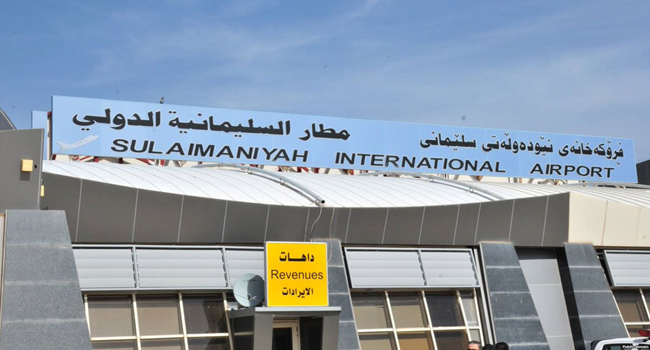Two days after the Turkish authorities announced the closure of their airspace to planes coming from Sulaymaniyah airport and heading towards it, Ankara reportedly targeted the airport with a drone on April 7th. Iraqi officials have demanded that Turkey apologize and cease hostile actions on Iraqi soil.
This attack raises many questions about its motives, especially since it coincided with the presence of Mazloum Abdi, the leader of the Syrian Democratic Forces militia, inside the airport. Additionally, the attack comes after positive developments in relations between Baghdad and Ankara. During Iraqi Prime Minister Mustafa Al-Kadhimi’s visit to Ankara on March 21st and his meeting with Turkish President Recep Tayyip Erdogan, the two leaders agreed to settle outstanding disputes.
Notable Timing
The Turkish convoy’s attack on the Sulaymaniyah airport in northern Iraq occurred at a significant time. This was after Turkey’s decision on April 5th to close its airspace to flights heading to or from Sulaymaniyah airport. Turkey justified its decision by accusing members of the Kurdistan Workers’ Party of intensifying their activities in the region and breaching the airport. Ankara classifies the group as a terrorist organization.
The attack seemed to be a message to Iraqi political and international forces supporting Kurdish militias. Turkey’s message was that it would continue its operations against them, particularly the Syrian Democratic Forces (SDF). The United States supports the SDF, which Turkey views as a significant party in the war against ISIS. This issue is a major point of contention between Ankara and Washington, and it remains unresolved.
Less than two weeks before the attack, an international arbitration case that began in 2014 and concerned the export of oil from the Iraqi Kurdistan Region through Turkey, had been resolved. On March 25th, the judicial ruling ordered a halt to oil exports from the Kurdistan Region of Iraq and the Kirkuk fields in northern Iraq through Turkey. This ruling is in line with Iraq’s accusation that Turkey violated international legal rules by allowing the Kurdistan Regional Government to export oil through a pipeline to the Turkish port of Ceyhan.
Four days after Iraqi Prime Minister Mustafa Al-Kadhimi’s visit to Ankara on March 21st, the ruling was issued. The visit marked a significant turning point in the relationship between the two countries, resulting in an agreement to develop the road that runs from Basra in Iraq to Turkey. Turkish President Recep Tayyip Erdogan referred to it as the “new Silk Road.” Additionally, Ankara committed to increasing the amount of water flowing from the Tigris River to Iraq for a month to address Iraq’s water scarcity crisis and its impact on agriculture.
Numerous Objectives
Turkey did not respond to the accusations of carrying out the attack and refrained from launching an anti-campaign against Iraq, which demanded an apology and an end to hostilities. It seems that Turkey is trying to adopt a dual policy by maintaining its relationship with the Iraqi government while continuing its confrontations with Kurdish militias in both the Iraqi and Syrian arenas. Therefore, it can be concluded that Turkey had multiple objectives in carrying out the recent attack, the most prominent of which were:
- Encircling the movements of the Kurdistan Workers’ Party (PKK): Ankara wants to continue to use the military option to manage the confrontation with the PKK in northern Iraq. It accuses the group of using Sulaymaniyah airport as a headquarters for planning terrorist operations against Turkish interests. Turkey’s approach may escalate in the coming period, particularly as Ankara grows increasingly concerned about the growing level of coordination between the Patriotic Union of Kurdistan (PUK) in Sulaymaniyah and the Syrian Democratic Forces (SDF) in northern Syria. The recent visit of Syrian Kurdish militia leader Mazloum Abdi to Sulaymaniyah caused significant concern for Ankara. Additionally, Turkey continues to reject US support for the SDF, especially after General Mark Milley’s visit to northeastern Syria on March 4th, followed by General Michael Corrilla’s visit to the same region a week later.
- Reproduction of the Iranian-Iraqi agreement: Ankara may be trying to push Baghdad to take similar steps to the ones it took in dealing with Iranian Kurdish opposition groups in northern Iraq, such as the Iranian Kurdistan Workers’ Party and the Komala movement, under the security agreement signed between Iran and Iraq during the visit of the Secretary of the Supreme National Security Council of Iran, Ali Shamkhani, to Baghdad on March 16th. Iran accuses these groups of attempting to transfer weapons into its territory and fuel internal protests. Therefore, Turkey may be seeking to replicate this agreement with Iraq to restrict the movements of the Kurdistan Workers’ Party.
- The attack on Sulaymaniyah airport by Turkey cannot be considered separately from its attempt to convey a message to Iran. Turkey and Iran are competitors in the Iraqi arena, and Turkey wants to demonstrate its capabilities, tools, and justifications for expanding its presence in Iraq.
It is worth noting that this attack occurred after an escalation of calls from Iraqi political factions loyal to Iran to expel Turkish forces from northern Iraq. These factions had previously emphasized the need for Ankara to take steps in this regard.
- The attack on Sulaymaniyah airport is a response by Ankara to the targeting of the “Zilkan” base, which hosts Turkish forces in Nineveh province in northern Iraq. The “Free Iraq Brigade” militia claimed responsibility for this attack on February 1st.
Turkey is exerting significant pressure on the parties opposing its presence in these areas by sending warning messages that it has the capability to increase the cost of offensive operations against its bases and interests in northern Iraq.
Negative Consequences
The recent targeting of Sulaymaniyah airport by a drone is part of Turkey’s military operations in northern Iraq. These operations directly threaten the positive developments in the current relations between Baghdad and Ankara.
On the other hand, the attack may provide the ruling Justice and Development Party with an opportunity to compensate for its declining internal presence and to support Ankara’s influence in the Iraqi arena.


